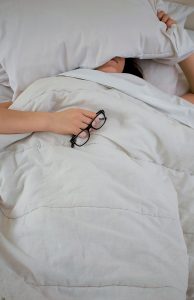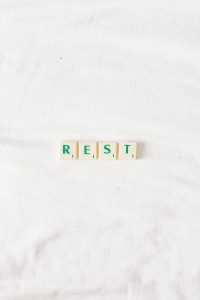The art of convalescence
We don’t have the time to get sick anymore, let alone time to get well
Whether it is getting over a bad head cold, or recovering from an injury, surgery, depression, cancer or a long illness, convalescence has been increasingly undervalued in our society. We are often told to “soldier on” through whatever ails us and when we do take time off we can feel under pressure to get back to work as soon as we are able. The message is clear, we have no time to be ill let alone give our body and psyche what it really needs to recover – rest and time.
Convalescence is the period of time it takes to recover and regain good health. The length of time depends on the nature of the initial problem. For example, those who’ve had the recent H1N1 influenza may have noticed that after five to seven days they were beginning to improve but it might have taken another week or two in order to fully recover. In this case the time between being totally bedridden and returning to normal is the period of convalescence.
The body is weaker than before and easily tired. What it needs most is rest and to be free of the usual daily demands. Although a week between sickness and good health may not seem long, for most parents, workers and students the time can often feel too precious to “waste” on resting at home. The consequences are twofold. You may still be infectious and pass the disease onto others (which ultimately increases your own workload). Also the stress of trying to function fully before your body is up to it can further weaken your immune system, predisposing you to complications or further bouts of illness.
Some assaults on the body take longer to recover from than influenza, such as invasive diseases, major surgery, mental health problems or physical injuries. Having a baby is another major health event and is made even tougher when recovering from a c-section. Often through this time you feel physically weak and easily tired. Even little things we usually take for granted, like getting up to go to the bathroom, are mulled over and planned to minimise exhaustion. After periods of inactivity, standing up and walking may cause dizziness and the muscles have lost condition and lack strength. The extent of the recovery period needed depends on how long the acute stage of ill health lasts.
Working and parenting are difficult to negotiate when convalescing. Not everyone has a partner, friends or extended family to take up the slack. But the reality is you take care of your family best by looking after yourself first. Convalescence may require asking for help, not something independent people always find easy to do. But when we are sick or debilitated there is no other choice. Your only job at this time needs to be is to rest, follow your health care team’s advice and allow your body to heal itself.
Those who are self-employed or work casually do not have paid sick leave. Often we can feel too busy, poor, impatient or worried that we will loose our job to give our body time to heal. There are lots of excuses and many of them valid on a practical level, however our body can’t hear them and instead goes into “survival mode” to carry on at times of exhaustion or pain.
In “survival mode” our autonomic nervous system activates the “flight or fight” response. So if we attempt to heal an injury, fight a disease, move through depression or recovery from surgery in this state there are fewer resources available to heal the body. The escalation from a pesky virus in an athlete who continues to train through a cold, to full on chronic fatigue syndrome has often been observed. Similarly, the new mum not given time to rest becomes more vulnerable to an attack of mastitis.
The risks of not resting and recovering adequately
Resisting the need to rest may increase:
- Poor wound healing
- Slower recovery time
- Increased chance of relapse or secondary infection
- Developing post-viral syndrome/Chronic Fatigue Syndrome/Fibromyalgia
Convalescent food
The quality of the fuel you ingest can have an impact on the speed you heal. The ideal convalescent diet includes:
- Smaller serves until appetite returns
- Organic fruits and vegetables
- Natural foods with no additives
- Warm, cooked meals are easier to digest than raw food
- Protein for tissue repair, eg fresh fish with omega 3 fatty acids, small quantities of lean meat (preferably slow cooked in soups or stews with vegetables), tofu
- Oats, slow cooked in porridge is a great nerve tonic
- Congee – a type of slow cooked rice porridge often served with a little meat, fish or vegetables is a great savoury alternative to oat porridge
- Shitake mushrooms, widely available dried in Asian grocery stores, are a traditional immune tonic.
Pure water and herbal tea (try good quality, organic herbs such as red clover, nettles, dandelions, chamomile and peppermint) - Fresh vegetable juices such as carrot and ginger
Foods to minimise of avoid while recovering
- Caffeine and alcohol
- Sugar (as it inhibits the white blood cells ability to fight infection)
Supplements to aid recovery
Please check with your physician or naturopath before taking supplements, as they may be contraindicated with some medications or underlying conditions.
- Vitamin C is a great tissue repairer and immune booster. Unless you are sensitive to vitamin C, take 500 mg three times a day.
- Zinc is involved in every enzyme system in the body and plays an integral role in the immune system. Adult dose 25 mg elemental zinc a day.
- Iron – if you have had surgery or been fighting an infection add your favourite iron supplement or try a liquid iron tonic.
- B vitamins – help repair the nervous system and are essential when we feel debilitated. Take a balanced B complex with at least 50 mg of B6.
Herbs to speed convalescence
In traditional herbalism “tonic” herbs are given during convalescence. These are often slightly bitter to aid the digestion, nutritive and restorative to the nervous system. Common herbs rich in minerals such as nettles and dandelion are popular. Gentle nervous system herbs such as oats, verbena and withania are also needed.
Depending on the nature of the debility specific herbs for the immune system or tissue repair may be needed.
For medicinal prescriptions it is best to consult an experienced herbalist who may be able to help you to recover more quickly.
Rest and recuperation
You can’t buy rest in a bottle. Unfortunately there is nothing that replaces it. Naps, gentle walks when you are up to it as well as fresh air are all part of the traditional prescription for convalescence.
Fresh air and sunlight are particularly important. A stuffy room, air conditioning and heating aren’t the best way to get oxygen into your cells. A little vitamin D-rich sunshine and fresh air has both physical and psychological benefits for your recovery.
Be aware of the blues – debility and feeling isolated are often triggers for depression. So too is a long observed phenomena of the post-viral depression. If you are not taking prescribed medicines, St John’s Wort (if you’re not taking any prescribed medication) may help but more importantly talk to friends, family and health professionals about how you are feeling. While depression is a natural reaction to debility, professional help can help you through this phase faster.
I enjoy convalescence. It is the part that makes the illness worthwhile.
George Bernard Shaw
Similar Posts:
Social Share
9 Comments
Leave a Reply
You must be logged in to post a comment.








Hi Gil,
I really enjoyed this piece and will no doubt find it very useful in the coming weeks. I’m undergoing fairly invasive breast surgery next week and just wondered whether you would make the same vitamin/herb recommendations in this instance, particularly considering I don’t have weeks to rest (I know, I know, not ideal!) and have been under a significant amount of stress these past few months?
I take multi-B (50mg B6), and cod-liver oil daily, and will start on Vit C pre-surgery. However, you mention zinc – would the quantity in a good quality multi be sufficient (14.35mg) or do you feel the higher dose is a necessity in convalescence? And is Vit E or Arnica taken internally useful for scarring, or is this just ‘an old wives’ tale’?! Many many thanks. Your site is an invaluable resource.
Hi Clem – I’m glad you found this information helpful.
A word of warning about some of the supplements you are taking pre-surgery. It’s important to come off Vitamin E and fish oils (ie: cod liver oil) before surgery, as they may affect bleeding. Even within the medical world there is no universally agreed on time line for this but stop them at least one – two weeks beforehand to be on the safe side.
Vitamin E is great post-op and it does decrease scarring. The arnica (homoeopathic – at least “30c” dose) is prescribed for trauma and bruising and is great to start taking was soon as possible when you come out of surgery, so take it to the hospital with you.
No nutrients will make up for shaving time off your convalescence. Try to take as much time as possible, then double it! Ask for help. Call in a few favours.
Good luck with the surgery.
Gill
Hi Gill,
I know you wrote this article a few years ago but I wanted you to know that I still read it. I often give it to friends when they’ve had an illness or been through a rough time and, sadly, I am currently undertaking the art of convalescence myself.
I think you clearly outline what we always struggle to do in these moments… forgive ourselves for not being ‘super human’, rest, eat the right foods, ask for help, nurture ourselves and indulge in (healthy) things that make us happy.
I was impressed that even the VIC State Government has an article about convalescence on the Better Health Channel (http://www.betterhealth.vic.gov.au/bhcv2/bhcarticles.nsf/pages/Convalescence?open).
May our society better embrace the art of convalescence!
~ Kirsty
Thanks Kirsty. It’s comments like yours that makes it worthwhile for me to spend the time to write articles like this 🙂
Oops, sorry, that Better Health Channel link is actually http://www.betterhealth.vic.gov.au/bhcv2/bhcarticles.nsf/pages/Convalescence
🙂
Pingback: On being ill — Gill Stannard
Pingback: On being a western herbalist: celebrating National Herbal Medicine Week — Gill Stannard
Pingback: Illness and the gentle art of surrender — Gill Stannard
Pingback: Gill Stannard » New year intentions and self-care: January 2023 update